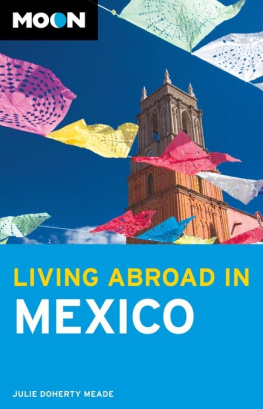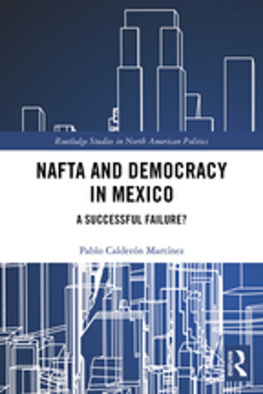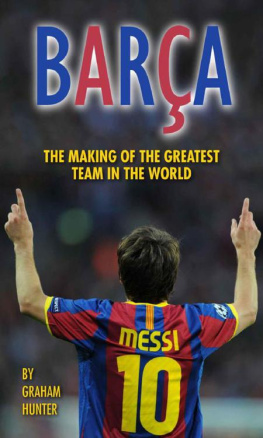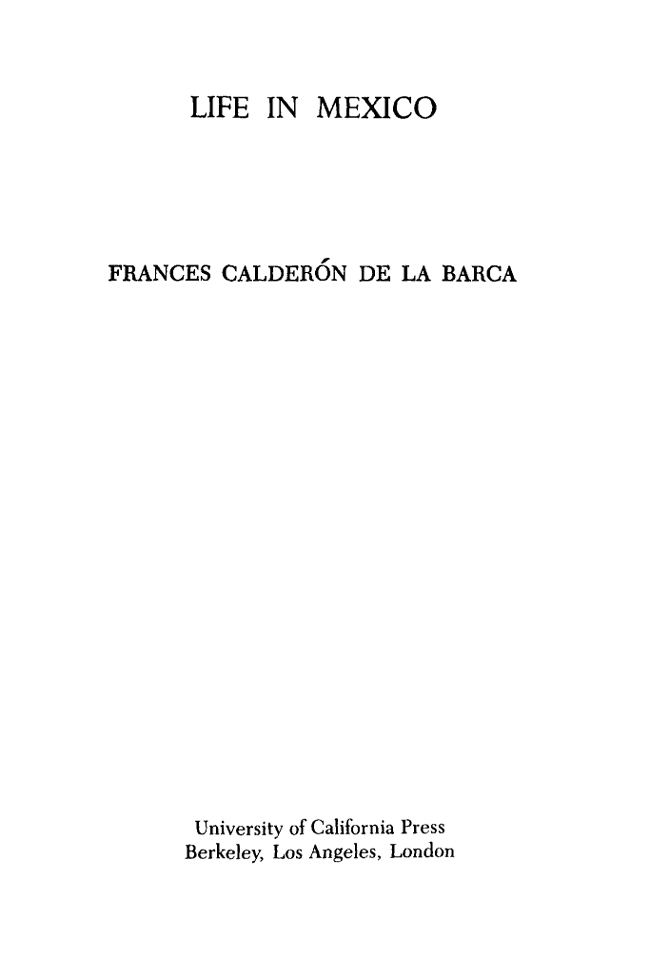LIFE IN MEXICO

LIFE IN MEXICO
FRANCES CALDERN DE LA BARCA
University of California Press
Berkeley, Los Angeles, London
University of California Press
Berkeley and Los Angeles, California
University of California Press, Ltd.
London, England
First California Edition 1982
ISBN 978-0-520-04662-7 (alk. paper)
Printed in the United States of America
16 15 14 13 12 11 10 09 08
10 9 8 7 6 5
The paper used in this publication meets the minimum requirements of ANSI/NISO Z39.48-1992(R 1997)
(Permanence of Paper). 
TABLE OF CONTENTS
PREFACE
The present work is the result of observations made during a two years residence in Mexico, by a lady, whose position there made her intimately acquainted with its society, and opened to her the best sources of information in regard to whatever could interest an enlightened foreigner. It consists of letters written to the members of her own family, and, really, not intended originallyhowever incredible the assertionfor publication. Feeling a regret that such rich stores of instruction and amusement, from which I have so much profited, myself, should be reserved for the eyes of a few friends only, I strongly recommended that they should be given to the world. This is now done, with a few such alterations and omissions as were necessary in a private correspondence; and although the work would derive more credit from the authors own name, than from anything which I can say, yet as she declines prefixing it, I feel much pleasure in making this statement by way of introduction to the public.
WILLIAM H. PRESCOTT.
Boston, December 20, 1842.
GLOSSARY
OF
SPANISH OR MEXICAN WORDS
Which occur in the course of the work, which are generally explained when first used, but which being repeated, the reader might forget and wish to refer to.
AdministradorAgent.
AlamedaPublic walk with trees.
AquadorWater-carrier.
AlacranScorpion.
AnqueraCoating of stamped gilt leather, edged with little bells, which covers the back of the horses.
ArrieroMuleteer.
ArrobaSpanish weight of twenty-five pounds.
AzoteaThe flat roof of a house.
BarrancaRavine.
BoticaApothecarys shop.
CalleStreet.
CargadoresMen who carry loads.
ChinguiritoSpirit made from sugar-cane.
ChileHot peppers.
Compadre and ComadreGodfather and Godmother; names by which two persons address each other, who have held the same child at the baptismal font, or have been sponsors together at a marriage, etc.
CannigoCanon or prebendary.
CmicosActors.
CamaristaLady of honour.
Dia de AosBirthday.
DulcesSweetmeats.
DirioDaily newspapers.
FrisonesLarge horses from the north.
FuncionSolemnityfestival.
FrijolesBrown beans.
GalopinaKitchen-girl.
GarbanzosChick-peas, Cicer Arietinum.
GachupinName given to the Spaniards in Mexico.
GaritaCity-gate.
GoletaSchooner.
GentuzaRabble.
HonrasFuneral honours.
HaciendaCountry-place.
Ingenio de AzucarSugar plantation.
InvlidosDisabled soldiers.
JarroEarthen jar.
LadronesRobbers.
LperosBeggars, low persons.
LiteraLitter.
Monte PioOffice where money is lent on security.
MezcalBrandy distilled from pulque.
MangaCloak made of cloth, with a hole in the middle for putting the head through.
NoviosBetrothed persons.
Nuestro AmoOur Master, used in speaking of the Host.
Ojo de AguaSpring of water.
PortalesCovered portico supported by columns.
PulqueriaShop where pulque is sold.
PasoPublic walk.
PasoPace, pacing,
PadrinoGodfather.
PlazaSquare.
PatioCourtyard.
PetateMatting.
PoblanaWoman of Puebla.
PronunciamientoA revolution in Mexico.
PronunciadosThose who revolt.
RanchoA farm.
RancheroFarmer.
RebosoA scarf that goes over the head.
RejaIron grate.
SopiloteSpecies of carrion vulture.
SarapeA woollen blanket more or less fine, with a hole for the head to go through.
TraspasoConveyance, transfer.
TilmaIndian cloak.
Tierra calienteThe hot land.
TertuliaAn evening party.
ToreadorBull-fighter.
TortillaSpecies of thin cake.
TortilleraWoman who bakes tortillas.
VacaJoint stock in gambling.
VomitoName given to the yellow fever.
VentaInn.
INTRODUCTION
Life in Mexico, by Fanny Caldern de la Barca, belongs to the accounts of travel and residence by foreigners which have furnished our most informative and perceptive reports on periods and countries. At their best, written by keen observers, endowed with incisive style and humor, they bring the objectivity and comparative point of viewat times the prejudicesof people bred and educated in another country. The foibles and oddities, the peculiarities of the country observed relative to others, stand out clearly as they could not in the observations of a native unless he were truly unusual. In Life in Mexico, the splendor, the misery, the political posturing and chronic instability of Mexican politics in 1839-1842 are sketched thoughtfully and incisively. So too are the luxury and crudity of a Mexican life which had not changed greatly from that of the eighteenth century and before which lay the immense changes of the decades to follow.
The author, who placed her name on the title page as Fanny Caldern de la Barca, was born Frances Erskine Inglis in Edinburgh on December 23, 1804, the fifth in what was to be a family of ten children. Her father, William Inglis, a well-to-do landowner, was a Writer to the Signet, in Scotland a special part of the legal profession; her mother, an Erskine, was related to the Earls of Buchan and other noble Scottish families. Frances, or Fanny as she preferred to be called, received a careful education including travel in Italy. In 1828, when her father was forced into bankruptcy, the family removed to Normandy, where in 1830 he died. Thereupon the widowed Mrs. Inglis, four of her daughters, including Fanny, and a number of grandchildren moved to Boston, where they opened a school. Scotland was then a prized source of school teachers, and they were well prepared for the role. The school enjoyed considerable success until it was involved in a scandal involving an anonymous satire on a charity bazaar of which Fanny was supposed to be co-author. Whatever the right of that story, the Inglis family moved in 1835 to the village of New Brighton on Staten Island, then a rural area of stately villas and farms and a vacation retreat from the tropical summers of Washington, D.C.











